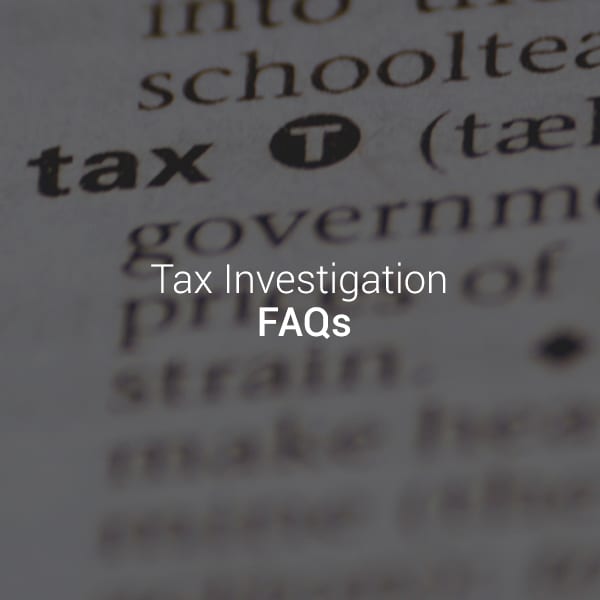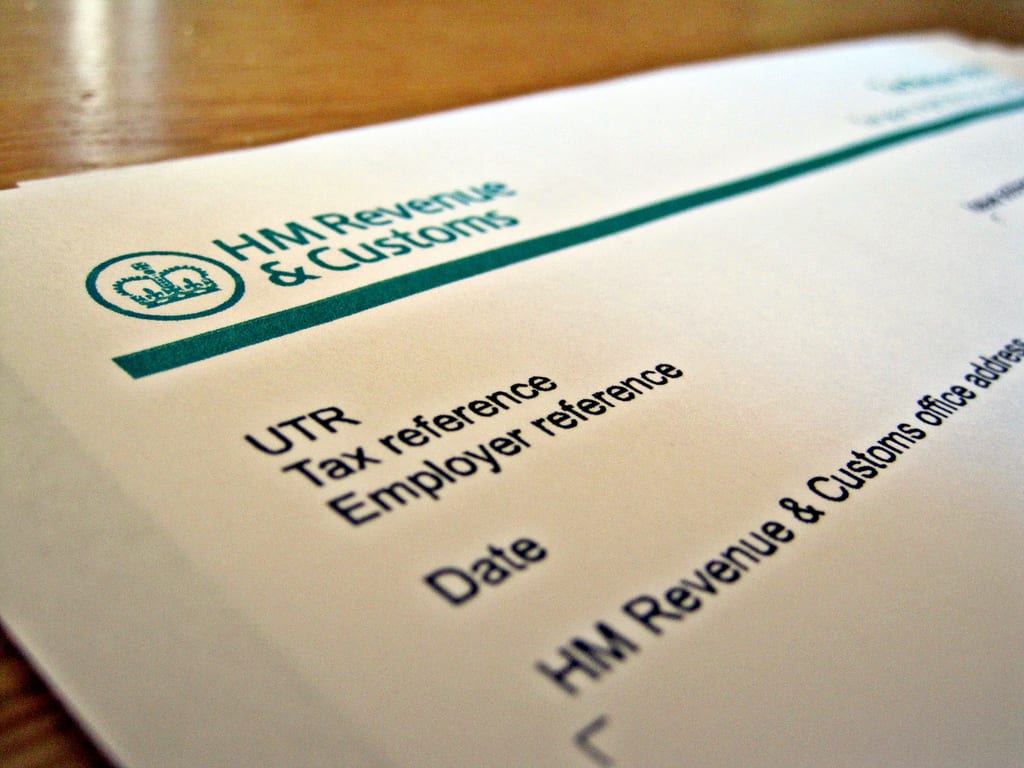HMRC Tax Investigation Help & Advice: What You Should Know
Home → Tax Investigations → Tax Investigation FAQs
HMRC Tax Investigations can be daunting due to the potential for fines, reputational damage, and criminal sentences. Here, our top tax investigation specialists offer their advice on the key information you should know if you find yourself being investigated by HMRC, or suspect that an investigation may be ongoing.
This tax investigation advice page answers a wide range of questions that you may have. Use the links below to navigate to the sections you’re most interested in – and if you find that your query isn’t answered here, don’t hesitate to contact our expert team today.
- What is a tax investigation and why am I being investigated?
- How will I know if I am being investigated, or will be in the future?
- How far back can the HMRC investigate?
- How much tax will I have to pay?
- Will I have to pay a penalty for underpaid tax?
- Will I have to meet or be interviewed by HMRC?
- How much paperwork will I have to produce?
- Will I get a prison sentence for tax irregularities?
- Is there publicity for tax investigations?
- How long does a tax investigation take?
- Will an HMRC investigation involve anyone else?
- How to avoid a tax investigation
- What should I do if I am under HMRC investigation?
1. What is a tax investigation and why am I being investigated?
A Tax Investigation is an official inquiry into your tax payment history. A Tax Investigation in the UK is conducted by HM Revenue and Customs (HMRC) with the severity of an investigation being completely dependent on the case. There can be many reasons for tax investigations and inquiries, for example;
- Following a tax return;
- As a result of a mistake or misunderstanding;
- Conflicting information from another source or whistle-blower;
- A random check;
- Or, because there is information which is incorrect.
The most important thing is to identify the type of the tax inquiry and how best to deal with it. Sometimes identifying the reasons behind the tax inquiry may assist in that. Often HMRC will be reluctant to disclose very much detail at the outset.
So if you know of an irregularity in your tax affairs and you do not know how to resolve it, or you are worried that you may be investigated or find yourself the subject of a tax investigation or prosecution, then it is vital that you receive expert advice as to how best to navigate your way out of trouble. It is strongly recommended that you consult a specialist tax lawyer as soon as possible. Get in touch with us today for a confidential initial consultation with our expert solicitors if you want to discuss your situation.
2. How will I know if I am being investigated, or will be in the future?
You will not be notified by HMRC as soon as it is looking into your affairs but if it decides to formally investigate you, you may receive a letter from one of its departments asking you for more information. This usually starts with limited scope such as a local compliance audit asking for more information about your latest tax return or a request for information regarding a property transaction, but it is not uncommon for these investigations to be extended should issues arise.
3. How far back can the HMRC investigate?
How far back the HMRC investigates during a tax investigation really varies and depends on the facts of each case. In some circumstances, HMRC may want to go as far back as 20 years to obtain information and documents. Other circumstances may be less than this.
As well as being time-consuming and expensive, depending on how far back the HMRC investigate, this can also present many practical problems for a lot of people. It is therefore important to know how to find solutions with the HMRC to avoid unpalatable estimated assessments.
4. How much tax will I have to pay?
Put simply, how much tax you have to pay depends on whether tax has in fact been underpaid. If so, HMRC will want it paid. However, a tax inquiry will seldom be as clear cut as HMRC believe at the beginning. Often there will be factual variations, sometimes technical tax issues, and often we will discover other issues that will mitigate the tax due.
5. Will I have to pay a penalty for underpaid tax?
If tax has been underpaid then very often a penalty will be payable in addition to the unpaid tax. Penalties can vary from as little as 15% to as much as 200% of the tax due depending on the nature and circumstances of the tax irregularity. Various factors are relevant and expert advice is important to try and mitigate any penalty.
6. Will I have to meet or be interviewed by HMRC?
No (and yes). Whilst HMRC will often request a meeting this can generally be avoided, and the information they are seeking provided by us in a way that is preferable for everyone.
In more serious cases where there is a tax crime investigation HMRC can request an interview under caution, and different factors have to be considered on a case by case basis. In the most serious cases, HMRC can arrest and conduct an interview under caution. Never attend an interview under caution with HMRC by yourself. You should always be represented by a specialist tax investigation lawyer.
7. How much paperwork will I have to produce?
Some cases can involve detailed analysis of large volumes of financial records, bank statements and other documents. You may require assistance from a specialist tax lawyer to help you obtain, collate, interpret and present this. Alternatively, sometimes the quantity of paperwork can be contained if the investigation is very specific.
8. Will I get a prison sentence for tax irregularities?
The media tends to report examples of the most serious HMRC frauds or those involving high profile individuals. The most serious HMRC frauds can result in lengthy prison sentences. However, not all criminal prosecutions result in prison sentences. More significantly, many HMRC criminal investigations do not need to lead to a criminal prosecution if handled correctly.
Most significantly, a tax investigation does not need to become an HMRC criminal investigation, including where tax evasion is alleged. This depends upon full and accurate disclosure of any irregularity and cooperation. The key to success is to obtain professional representation from a specialist tax lawyer who will have experience of handling a variety of tax investigations.
9. Is there publicity for tax investigations?
Not with the vast majority of investigations. This really only happens for those HMRC fraud cases that become criminal prosecutions. Since 2010 HMRC has reserved the right to name and shame in more serious cases but this is not common.
10. How long does a tax investigation take?
Exactly how long a tax investigation will take depends on the scope of HMRC’s investigation and the volume of paperwork involved. It could take a few months or even up to a year. HMRC could delay your tax investigation further by asking you for additional information. However, depending on the nature of the case, there are various ways that an experienced tax lawyer can reduce the amount of time a tax investigation needs to take.
11. Will an HMRC investigation involve anyone else?
Whilst it depends on the taxpayer’s particular circumstances, there can be a danger that HMRC investigations and inquiries could widen to include linked business associates (companies, directors, partners, etc.) or even a spouse or other family members. Sometimes this will be unavoidable (and can even help although it is not pleasant) but often early professional intervention by specialist tax investigation lawyers can result in alternatives.
12. How to avoid a tax investigation
Apart from the minority of genuinely random inquiries, HMRC will commence an investigation for a reason. Sometimes this will be due to information that the taxpayer is unaware of or a misunderstanding of information that has been provided. There is very little that can be done to avoid an investigation in these circumstances.
However, very often an investigation is the result of affairs that the taxpayer is aware of, and for some taxpayers they know that eventually, one day HMRC will be asking questions and may investigate them. These are the situations where a tax investigation, and the worst aspects of one, can be avoided.
You know your tax and financial affairs. Are there things that you know HMRC would take action about if they knew? Are there things that HMRC would be likely to investigate to see if you have paid sufficient tax? Are there aspects of your tax affairs that you are unsure or feel uncomfortable about?
If the answer is yes to any of the above questions, then it is vital to take professional advice from a specialist tax investigation lawyer without delay. This will set your mind at rest, but more importantly, you will obtain expert advice on how to avoid or minimise a tax investigation.
If with professional support from an experienced tax lawyer, you go to HMRC first and make a disclosure before they have started an investigation and come to you, it is highly likely that there will not be a criminal tax investigation, and even in serious cases that a prosecution and prison will be avoided.
13. What should I do if I am under HMRC investigation?
It is better to instruct a specialist tax investigation solicitor first. If it is appropriate later to involve an independent tax expert or a forensic tax accountant then if we do this on your behalf, your relationship with them will be covered by our Legal Professional Privilege, ensuring you can rely on complete confidentiality being protected.
If you are facing a tax investigation, or you are concerned that you may do in the future, contact us today to speak to one of our tax litigation lawyers, for expert and confidential advice.
14. Ask another question
Do you have another question relating to Tax Investigations that hasn’t been covered in our guide? Feel free to contact Richard Nelson LLP’s Tax investigation solicitors and we’ll endeavour to get back in touch with you as soon as possible.
Richard Nelson LLP provides an industry-leading tax investigation service. Depending on the nature of your tax investigation, you can view our differing services below:



